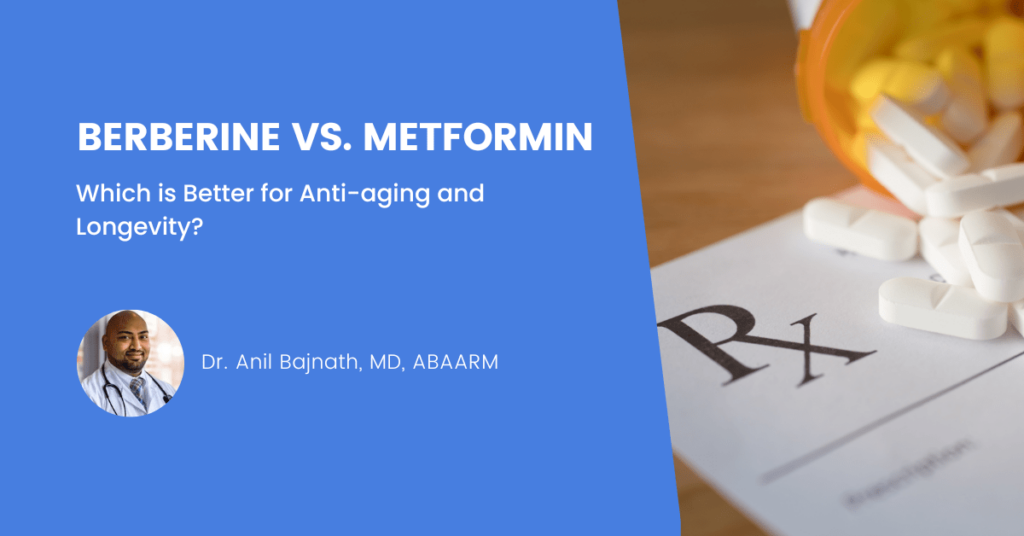
CEO and Founder at The Institute for Human Optimization
Dr. Anil Bajnath, MD, IFMCP, ABAARM, is a board-certified family physician who specializes in precision and anti-aging medicine. His practice offers a range of services from conventional preventative screening guidelines to precision personalized healthcare modalities including individualized nutrition, genomic medicine, advanced biomarker testing, microbiome analysis, and biometric lifestyle monitoring.
Dr. Bajnath sees patients in his clinic in Annapolis, Maryland, and also offers telemedicine consultations. To schedule an appointment with Dr. Bajnath or learn more about his research, click here.
Overview | Longevity connection | How they work | Glycation | Blood sugar | Lipids | Senolytics | References
In this long-awaited “berberine vs. metformin” article series, we collaborated with Dr. Anil Bajnath, MD, the founder of the Institute for Human Optimization and an expert in the field of longevity and anti-aging medicine. Dr. Bajnath started with a basic overview of each compound, how they work, and dived right into some exciting evidence and potential benefits of berberine and metformin for longevity.
While both berberine and metformin have various uses, in this article we focus on anti-aging and longevity. For those of you who are interested in berberine as a natural substitute to metformin, make sure to read our second article on this series, as we’ll be diving into some important cautions and potential side effects of berberine along with strategies to mitigate them.
What is metformin?
Metformin is a medication that’s used to help control blood sugar. In fact, it’s the most prescribed medication for type 2 diabetes and has been used since the 1950s. Here are a few things you should know about metformin:
- Millions of people take metformin daily for diabetes or prediabetes[1].
- Mainstream doctors also prescribe metformin for polycystic ovarian syndrome (PCOS). This is a condition of hormonal imbalance that’s fairly common in women. You can think about PCOS as diabetes of the ovaries, as some of the same biochemical pathways we see in diabetes are involved.
- Because it’s so commonly prescribed, metformin has been widely studied over the course of many years. This means that we have a lot of data on metformin – both on its beneficial effects and its possible side effects. In fact, this huge amount of data is one reason that some people prefer metformin over berberine. You know exactly what to expect with a medication that is so well-studied.
What is berberine?
Berberine is a plant-derived compound that’s been used in traditional Chinese medicine and Ayurvedic medicine for thousands of years.
- Berberine is found in a variety of different plants, including goldenseal, Oregon grape, and barberry.
- In traditional medicine, berberine has a wide variety of uses including treating infections, improving digestive issues, supporting the liver and kidney, and even as a remedy for skin and eye problems[2].
- Although berberine has not been quite as widely studied as metformin, it has received quite a bit of attention in research studies. Admittedly, the data on berberine is not quite as robust as the data on metformin, we don’t have as many years of research on this compound. Still, we do know quite a bit about berberine, and what we’ve learned so far is intriguing.
The longevity story of metformin and berberine
Because metformin has been so widely prescribed, its effect on mortality has been studied extensively. Initially, the researchers found that diabetic patients who took metformin had a longer lifespan. But was it because metformin was able to reduce the negative side effects of chronic high blood sugar or something else? The researchers started to wonder whether metformin’s ability to extend lifespan might go beyond its ability to help with diabetes, and whether it might promote longevity in people without diabetes too. Since then, we have seen a growing number of studies involving healthy non-diabetic subjects, with promising results.
One landmark study in non-diabetic mice showed that metformin increased mean lifespan by 37.8%, and maximum lifespan by 10.3%[3]. These are promising results. Interestingly, studies with berberine have shown similar effects. When middle aged mice were given berberine, their overall survival was extended by 16.5%, and their remaining time increased by 80%. Even more, their fitness level and fur density were also improved[4].
So, we have evidence that both berberine and metformin may extend lifespan and healthspan. We do need to consider, however, that for humans, it’s harder to get reliable data on the effects a compound may have on longevity. You can simply give mice metformin or berberine every day for their whole lives and see what happens, but there are a lot of reasons why this approach won’t work in humans. Our lifespan is much longer. Not to mention, it’s unrealistic to expect people to agree to be randomized to taking a drug or a placebo every day for their entire lives. And even if they did agree, it’s extremely unlikely that they’d all successfully follow through.
Additionally, at this point we don’t yet have data on exactly how much metformin or berberine could increase our lifespan or healthspan. Instead, we can look at surrogate markers for healthy aging, like the formation of advanced glycation end products (AGEs), and various risk factors such as high blood sugar. (We’ll cover more on these in this article as well). The good news here, is that as we speak, researchers continue to dive into the anti-aging activity of berberine and metformin. With studies like the Targeting Aging with Metformin (TAME) trial in progress, we should have much more data soon.
One thing is certain. At this point, we already see the longevity promoting potential of both metformin and berberine.
How berberine and metformin promote longevity
Although berberine and metformin are fairly different chemically, they both activate an important central pathway known as AMPK, that has been shown to play a key role in longevity and aging[5].
AMPK regulates glucose and lipid metabolism within the cell, causing cells to take up and more effectively use these nutrients. This results in efficient energy production in the cells. Activating AMPK has also been extensively studied as a way to promote autophagy[6] – the process by which the body gets rid of old or damaged cells. Autophagy can help with longevity and may reduce cancer risk by removing damaged cells before they can become malignant. AMPK can also encourage new cell growth, which may help to maintain healthy functioning tissues.
Because AMPK is involved in so many different processes within the cell, both berberine and metformin have a wide variety of effects on health. Next, we’ll dive into some of the key potential benefits related to longevity.
Glycation and blood sugar control
An emerging body of research suggests that blood sugar control may be very beneficial for our health and longevity. When blood glucose levels rise, the sugar starts reacting with proteins around it, creating a class of harmful compounds called advanced glycation end products, or AGEs. The accumulation of AGEs in various tissues is a known hallmark of aging, and has shown to contribute to many age-related diseases[7].
You may recognize one type of AGE, hemoglobin A1c (also known as HbA1c or A1c) from the last bloodwork your doctor ordered, as this is the test that measures your average blood sugar levels over the past 3 months.
The higher your blood sugar levels are, the more A1c AGEs are formed. Not surprisingly, higher A1c levels are strongly correlated with increased mortality. Compared with people who have a normal A1c levels (below 5.6), those with an A1c of 6.5 have a 30% greater risk of death within a decade or so[8]. And if you think this is bad, in those with an A1c of 9.0 or greater, mortality risk is nearly doubled.
Time for some good news. Turns out that both berberine and metformin may be great options to help control blood sugar and glycation:
- Metformin is well-known for this effect as it is such a widely used diabetes drug. To give you an idea, metformin can lower A1c by 1.1 points on average. So, someone whose A1c is 7.5 before taking metformin, can expect to get to about 6.4 with metformin[9]. That said, the specific results can vary from person to person, and there are many other factors to consider that can affect A1c levels.
- Berberine has also been found to be effective in reducing A1c[10]. In fact, according to some evidence, berberine may have an edge when it comes to blood sugar control. A recent large meta-analysis of several randomized controlled trials showed that berberine was more effective at improving insulin resistance than metformin[11].
- Taking metformin with berberine. In some cases, people take both berberine and metformin at the same time, and there’s actually some research showing that this combined approach may be more effective than each compound alone[12]. I wouldn’t recommend taking them both if you don’t have any issues with your blood sugar control, however, as that may be an overkill. You could potentially lower your blood sugar too much. But if you are struggling with your blood sugar this may be something you and your doctor can consider.
Lipid metabolism
Next to blood glucose control, making sure your blood lipids are optimal is another important anti-aging strategy shown to help with longevity, lifespan, and age‐related disease prevention[13].
Also here, both metformin and berberine have demonstrated efficacy, with berberine performing somewhat better than metformin in some studies. Those who took berberine had slightly lower total cholesterol and LDL, and higher HDL, than those who took metformin[14]. These differences were not huge, but we can definitely say that berberine was shown to be effective at improving blood lipid levels, at least as well as metformin.
Even more, the lipid-lowering activity of berberine has also been compared to simvastatin, a drug widely prescribed for people with imbalances in blood lipid levels. The efficacy of berberine was found comparable to simvastatin. Much like the results of pairing berberine and metformin for glucose control, combining berberine with simvastatin was more effective in lowering LDL than each alone[15]. On that note, and similarly to blood glucose, the idea is to reach optimal levels, and not to reduce the levels as low as you can. High levels of circulating LDL are indeed associated with both cardiovascular and all-cause mortality[16], but very low levels have also been shown to increase mortality risk[17].
Interestingly, both berberine and metformin regulate lipid metabolism through a variety of mechanisms. One of these is through the inhibition of a protein called PCSK9. This protein can attach itself to LDL receptors, which inhibits the uptake of LDL into the cell, leaving more of it in the blood. By inhibiting PCSK9, the uptake of LDL cholesterol into the cells is enhanced, so that blood levels are then lowered[18,19,20]. Additionally, through their activation of AMPK, both berberine and metformin are also able to increase the expression of the LDL receptor, which causes more LDL to end up in cells and less of it to circulate in the blood.
Are berberine and metformin senolytics?
If the thought of mutated cells wreaking havoc throughout your entire body sounds like a scene from from a scary sci-fi movie, you may want to sit down before you continue to read, as we are about to share interesting research on cells known in the literature as zombie cells.
For those of you who may not be familiar with senescent cells and their role in aging, here’s a brief summary.
- Senescent cells are damaged aging cells that stop dividing and multiplying but don’t die when they should. Just like zombies, they stick around and cause a whole lot of trouble to nearby healthy cells.
- As a part of the problem they cause, senescent cells release substances that can interfere with the functioning of healthy cells around them. Studies have shown that senescent cells tend to accumulate in aging tissues all over the body and are linked to age-related disease[21].
- On the flip side, preventing the accumulation of “zombie cells” has shown promise in delaying the onset of certain conditions. You as may expect, cellular senescence is considered by many longevity researchers as a major contributor to the aging process and is a known hallmark of aging[22].
- Senolytics are agents that cause senescent cells to die off, which could help to slow the process of aging and reduce the risk of age-related diseases. For this reason, senolytics have generated a surge of interest in the anti-aging world, as a potential way to slow aging[23].
Now, neither berberine nor metformin is technically a senolytic because they don’t directly cause the death of senescent cells. They can, however, help with senescent cells indirectly by promoting autophagy. As the body gets rid of old and tired cells that are no longer functional, this can also mean reducing the senescent cell burden.
On that note, there’s a lot more to be said about senescent cells. If you are looking for ways to help your body remove senescent cells, make sure to subscribe to our longevity newsletter, as we will cover this topic more extensively in the upcoming articles, including natural senolytics, supplements, foods, and other practical evidence-based ways that can help your body get rid of these zombie cells.
Berberine vs. metformin – Final thoughts
As you can see, both berberine and metformin have shown a lot of anti-aging potential. But which one is the right one for you?
While everyone is different, in general, I tend to recommend berberine over metformin for my patients who are interested in longevity. As a natural way to support healthy aging, berberine has shown to be safer, has a wider array of benefits, and according to the data, seems at least as effective as metformin. In fact, there are certain side effects that are more common with metformin that seem to be reduced or absent with berberine.
Additionally, berberine is known to have pleiotropic effects[24], which means it can act on more than one target in the body. This means you may get several other health benefits when you take berberine.
If you are considering adding berberine to your natural anti-aging or longevity supplement stack, you may want to have a look into our next article titled Is berberine a good natural alternative to metformin? I shared some cautious concerns about berberine and ways to mitigate them.




